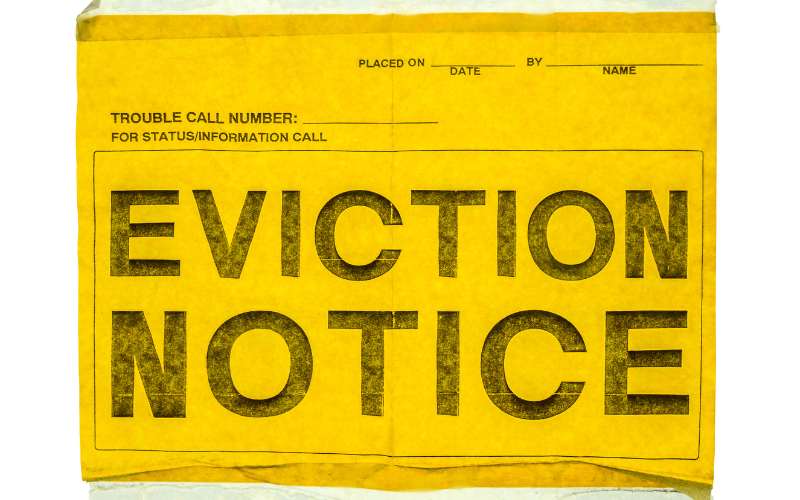Last Updated on March 18, 2024 by Kelvin Nielsen
If you’re a landlord in Delaware, it’s essential to understand the state’s eviction laws. One of the most important aspects of these laws is the 5-day eviction notice.
This notice is a legal document that landlords can use to start the process of evicting a tenant who has failed to pay rent. In this article, we’ll take a closer look at what a 5-day eviction notice is and how it works in Delaware.
A 5-day eviction notice is a legal document that landlords can use to demand payment from tenants who are behind on rent. The notice gives the tenant five days to pay the amount owed or vacate the property.
If the tenant fails to comply with the notice, the landlord can then file a formal eviction lawsuit in court. The process can take around one to three months, depending on the type of eviction. If tenants request a continuance or jury trial, the process can take longer.
Understanding eviction laws in Delaware is crucial for landlords who want to protect their property and their rights. By knowing what a 5-day eviction notice is and how it works, landlords can take the necessary steps to ensure that they are following the law and protecting their interests. Let’s take a detailed look at a 5-day eviction notice in Delaware.
Related Posts:
- Can You Withhold Rent in Delaware? A Guide to Tenant Rights
- Can You Break Your Lease Early in Delaware? A Guide to Lease Termination
- Can a Landlord Break a Lease in Delaware?
- Delaware 30-day notice to vacate
Key Takeaways
- A 5-day eviction notice is a legal document that landlords can use to demand payment from tenants who are behind on rent.
- The notice gives the tenant five days to pay the amount owed or vacate the property.
- Understanding eviction laws in Delaware is crucial for landlords who want to protect their property and their rights.
Understanding Eviction Laws in Delaware

If you are a landlord or a tenant in Delaware, it is important to understand the state’s eviction laws. Delaware has specific legal procedures that must be followed when evicting a tenant, and failure to do so can result in legal consequences. In this section, we will discuss the legal grounds for eviction, the eviction process, and the tenant’s rights and protections.
Legal Grounds for Eviction
In Delaware, a landlord can evict a tenant for several legal reasons, including:
- Failure to pay rent
- Violation of the lease agreement
- Damage to the rental property
- Engaging in illegal activities on the property
If a landlord wishes to evict a tenant for any of these reasons, they must provide the tenant with a written notice of the eviction. The notice must include the reason for the eviction, the date by which the tenant must vacate the property, and any other relevant information.
Eviction Process
The eviction process in Delaware begins with the landlord providing the tenant with a written notice of eviction. The notice must be delivered to the tenant in person or by certified mail. In cases of non-payment of rent, the landlord must provide the tenant with a 5-day notice to pay rent or quit.
If the tenant does not vacate the property by the date specified in the notice, the landlord can file a complaint for summary possession with the court. The court will schedule a hearing, and if the judge finds in favor of the landlord, they will issue a writ of possession. The writ of possession gives the landlord the legal right to remove the tenant from the property.
Tenant’s Rights and Protections
Tenants in Delaware have certain rights and protections under the law. For example, a landlord cannot evict a tenant in retaliation for reporting a code violation or requesting repairs. Additionally, a landlord cannot shut off utilities or change the locks in an attempt to force a tenant to vacate the property.
If a tenant believes that their landlord is attempting to evict them illegally, they can seek legal assistance. Organizations such as Legal HelpLink can provide tenants with information and advice on their legal rights and options.
Overall, understanding eviction laws in Delaware is crucial for both landlords and tenants. By following the proper legal procedures and understanding your rights and protections, you can avoid legal issues and ensure a fair and just eviction process.
Detailed Look at A 5 Day Eviction Notice in Delaware
If you are a landlord in Delaware and your tenant has failed to pay rent, you may be able to evict them by serving them a 5-day eviction notice. In this section, we will take a closer look at what a 5-day eviction notice is and how it works in Delaware.
When is it Used?
A 5-day eviction notice is typically used when a tenant has failed to pay rent. According to Delaware law, a landlord can give the tenant a five-day notice to pay rent if the tenant fails to pay rent when it is due. The notice must inform the tenant that they have five days to pay rent or the landlord will terminate the tenancy.
Contents of the Notice
The notice must include the following information:
- The name and address of the tenant
- The amount of rent owed
- The date the rent was due
- A statement that the tenant has five days to pay the rent or the tenancy will be terminated
- The landlord’s signature and date of service
It is important to note that the notice must be served to the tenant in person or by certified mail. If the notice is served by certified mail, the landlord must also post a copy of the notice on the rental property in a conspicuous place.
What Happens After the Notice is Served?
If the tenant fails to pay the rent within five days of receiving the notice, the landlord can file a complaint for possession in court. The tenant will then be served with a summons to appear in court. If the tenant fails to appear in court, a default judgment may be entered against them, and the landlord can obtain a writ of possession to have the tenant removed from the property.
It is important to note that the eviction process in Delaware can take around one to three months, depending on the type of eviction. If the tenant requests a continuance or jury trial, the process can take longer.
Conclusion
In conclusion, a 5-day eviction notice is a legal document that a landlord can use to evict a tenant who has failed to pay rent in Delaware. The notice must include specific information and must be served to the tenant in person or by certified mail. If the tenant fails to pay the rent within five days of receiving the notice, the landlord can file a complaint for possession in court.
Disclosure: The content herein isn’t a substitute for advice from a professional attorney. It’s only meant to serve educational purposes. If you have a specific question, kindly seek expert attorney services.
Sources: DELAWARE RESIDENTIAL LANDLORD-TENANT CODE, Tenant Eviction Rules, 30-Day Notice to Vacate in Delaware

Amanda Rose is a seasoned landlord with 13+ years of expertise in overseeing diverse properties. Her adept management spans single and family homes, along with multi-family apartments and condos, across Wyoming and South Dakota. Her commitment and proficiency have cemented her status as a thriving property management professional.
She is a member of the following organizations: Wyoming Landlord’s Association, National Association of Residential Property Managers (NARPM), Wyoming Apartment Association, South Dakota Multi-Housing Association (SDMHA), and South Dakota Landlord Association (SDLA).







